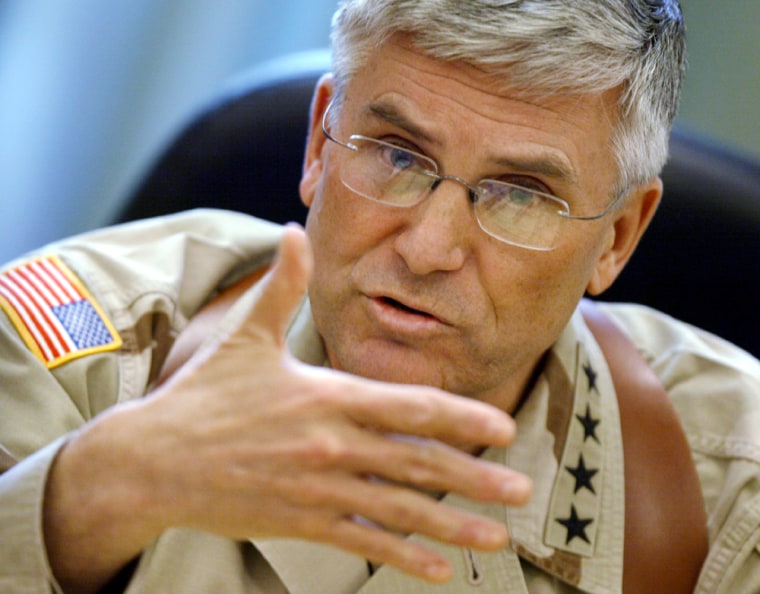The top U.S. commander in Iraq said Wednesday that U.S.-trained Iraqi security forces were still not ready to take over the counterinsurgency and that there was no guarantee that they would ever be able to defeat militant guerrillas on their own.
The commander, Army Gen. George Casey, said that the 130,000 Iraqi police and soldiers still lacked leaders to direct them in a fight against rebels and that local police who had deserted in the thousands remained a key weak point.
Training and equipping Iraqi troops to take the lead role here is a central pillar in U.S. efforts to rein in insurgents and eventually pull U.S. and other foreign troops out of the country. But the Iraqi forces have been criticized for poor training and lack of leadership.
“Can I sit here and look you in the eye and say that the Iraqi security forces — guaranteed 100 percent — are going to be able to defeat this insurgency by themselves? Of course not,” Casey said.
“From what I’ve seen in the seven months that I’ve been here, I believe that we can achieve capable Iraqi security forces over a period of time that can deal with the Iraqi insurgency that’s here.”
Handover talks to start after election
British Prime Minister Tony Blair said in an interview published Wednesday that U.S.-led coalition forces and Iraqi officials would begin discussing the handover of security responsibilities to Iraqi forces after national elections Sunday.
Blair did not set out a clear timetable for the transfer, telling The Financial Times that the move would come only when Iraqi forces were up to the job.
But he said the coalition was “looking with the Iraqis now at what are the timelines for the Iraqi-ization to be achieved.”
After the election, “we have got to sit down with the new government and look at how we manage the transition,” Blair was quoted as saying. “There are areas where we would be able to hand over to those Iraqi forces. Remember, 14 out of the 18 provinces in Iraq are relatively peaceful and stable.”
The elections will be a key test, as Iraqi troops take the commanding role in efforts to secure the vote. The stakes are high. Insurgents have pledged to shower polling stations with mortar fire, car bombs and gunfire in an effort to derail the election for a 275-member National Assembly.
“There’s going to be violence on election day, but millions of Iraqis are going to vote on January 30, and to me that’s extremely significant. You’re going to see the continued triumph of democracy over tyranny,” Casey told reporters in Baghdad’s fortified Green Zone.
Casey, who commands all multinational forces in Iraq, said that after the election U.S. trainers and advisers would work more closely with Iraqi forces, focusing on building senior division and brigade-level leadership.
“The weak pole in the tent right now is the local police,” he acknowledged.
In November, a 5,000-member police force in the northern city of Mosul fled their posts as fighting swept the city.
New training regimens
U.S. trainers have modified eight-week programs to focus on fighting the insurgency, which Casey says has gotten more organized in recent months.
“Now, are they capable of taking over the counterinsurgency campaign themselves right now today? The answer’s no,” Casey said.
Iraqi forces still lack the ability to develop an intelligence network, draw up combat plans and support them logistically and even defend the institution of the army itself, the general said.
“We cannot stay here forever in the numbers that we’re here now. ... Iraqis have to take ownership over this,” Casey said.
The general put the number of Iraqi police and army forces at 130,000, although some U.S. lawmakers complain that only a small percentage can be described as well-trained.
“You can get into a debate about are they fully trained,” Casey said. “Well, what do you mean by fully trained? ... What’s important is they’re in the fight.”
The Defense Department has said it ultimately hopes to train about 135,000 Iraqi police and 85,000 army troops.
Casey would not venture a guess on how many rebel fighters remained. He said 15,000 had been captured or killed over the past year.
